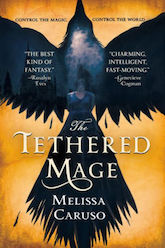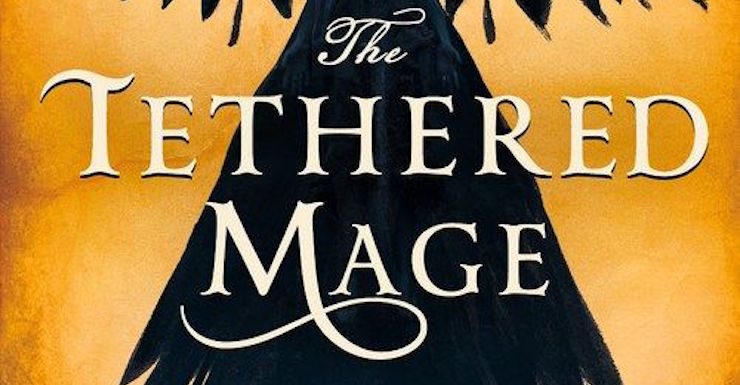Back in late spring, a certain person at Orbit taunted me by sending me the first chapter of Melissa Caruso’s debut fantasy The Tethered Mage. (There are advantages and disadvantages to having people know your tastes.) I believe my reply to that particular incident of priming the pump (as it were) can be summarised as “You are evil. This is SO GOOD. WHAT HAPPENS NEXT?”
I’ve had to wait until now to find out. The really excellent news, though, is that The Tethered Mage is not as good as its first chapter would imply.
It’s better.
Though I should probably confess, in the interests of fairness and full disclosure, that I’m biased towards Venetianesque fantasies. There’s something about cosmopolitan cities built on trade and conquest, ruled by an oligarchy with some democratic elements, that has—who’d have thought?—an enduring appeal to my historian-of-Greece-and-Rome heart. Also, canals. Canals and canalised cities are badass.
Buy the Book


The Tethered Mage (Swords and Fire)
Raverra is the seat of the Raverran Empire, an empire built on trade, clientage, and the projection of military power. The city, and in consequence the empire, is ruled by a doge and a council of seven—whose council seats are filled partly by oligarchic election, and partly by inheritance among the most powerful Raverran aristocratic families. One of the reasons behind Raverra’s dominance is its approach to harnessing magic: people born with power are taken as children and conscripted into the branch of the military known as the Falcons, “jessed,” their magic subject to the control of a Falconer. (The Falcons are, fortunately, less dystopian than they seem from this summary.)
Lady Amalia Cornaro is the heir to one of Raverra’s most prominent families. Her mother, Lissandra Cornaro, “La Contessa,” holds one of the inherited seats on the doge’s council, and is the éminence grise of Raverra’s intelligence-gathering operations. Amalia is more of a scholar than a schemer, who’s a little unsure of her ability to follow in her mother’s footsteps. But when she finds herself called upon to jess a warlock in an emergency situation, she has to rapidly step up to the challenge. Heirs to great houses do not become Falconers. Amalia cannot put herself under the doge’s command—but she cannot directly refuse it, either. Worse, unrest in the Raverran client state of Ardence—where Amalia studied, and where she still has friends—may result in a war in which Amalia and her Falcon will be compelled to serve, as rival power Vaskandar manoeuvres to threaten Raverra’s borders and its control of its client states.
Zaira, Amalia’s new Falcon, has spent her life avoiding conscription into the Falcons, hiding her mage mark and making a living through scavenging and theft. She has no family, no close ties to anyone, and she really resents being tied to the Falcons and to someone like Amalia. And being a weapon in anybody’s arsenal—because her power is rare and dangerous and can destroy cities.
The characters in The Tethered Mage are a delight and a joy. Although it’s told in the first person from Amalia’s point of view, the other characters come through sharply, as whole people with their own ideas and concerns—even if Amalia, as a narrator, doesn’t have a full picture of what’s going on. Zaira’s confrontational, brash, and complex. Her confrontational approach comes in part from a history of pain. The slow dance of prickly mistrust that grows into co-operation and eventual friendship—well, sort of friendship—between her and Amalia is one of the novel’s delights, along with Zaira’s pragmatism and her snark.
Among a cast of outstanding and compelling characters, Zaira stands out—as does La Contessa, Amalia’s mother, an extremely adept political operator who combines concern for her (and her house’s) political standing with worry for her daughter’s success and wellbeing. She’s an intimidating parent to live up to, but the reader is never left doubting that she both loves her daughter and believes in her potential: she lets Amalia stand on her own, but provides support and protection, too. They come into conflict over Amalia’s attraction to Falconer lieutenant Marcello, whose pedigree makes him an unsuitable connection for a Cornaro, but even here, they talk about the pragmatics of why, and Amalia understands that it’d be irresponsible of her to make precipitate choices.
Have I mentioned the juicy, twisty, well-thought-through intrigue? The tight pacing? The excellent atmosphere? Interesting worldbuilding? This is a compelling first novel, with female characters at its heart. The tension mounts, and there’s plenty of action and incident and fire and danger, as well as balls and meetings in which people try to ferret out information about each other’s goals and motives. The conclusion is satisfying and completes a whole story in one volume—although there’s a promise of a sequel, The Defiant Heir, sometime next year.
In short, I loved it. I WANT MORE.
Footnote: it is also pleasing to me that at least one of the main characters is attracted to men and women, and that this appears to be a setting in which chauvinism is minimal, and marriage between men or between women is unremarkable. (Small things to ask, these days, one might think. But you’d be surprised how often you don’t get them.)
The Tethered Mage is available from Orbit.
Liz Bourke is a cranky queer person who reads books. She holds a Ph.D in Classics from Trinity College, Dublin. Her first book, Sleeping With Monsters, a collection of reviews and criticism, is out now from Aqueduct Press. Find her at her blog, where she’s been known to talk about even more books thanks to her Patreon supporters. Or find her at her Twitter. She supports the work of the Irish Refugee Council and the Abortion Rights Campaign.










